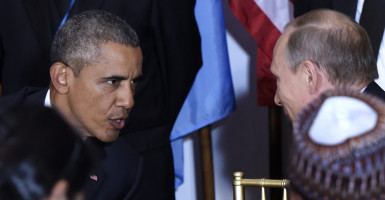I never thought I’d say this, considering recent events, but we may have to—gulp—thank Russia for something: a potential positive (and long overdue) shift in our Iraq/Syria/Islamic State/al-Qaeda policy, which has been both flailing and failing.
While the White House would deny it, it’s very likely that the Kremlin’s intervention into the Syrian civil war late last month—and its current and possible longer-term effects—helped spur the Obama administration to rethink its plans.
As you know, the Russians have moved to militarily—and (im)morally—prop up the regime of Syrian President Bashar Assad, whose forces have transitioned from being on the brink of defeat to being on the offensive.
Not only have the Russian air strikes on anti-Assad groups given the regime some breathing room, but they’re giving a bit of a breather to the Islamic State, too.
Moreover, regional states are giving Russia a second look as a current and future partner, seeing the United States as—shall we say—less than effective in getting the job done against the Islamic State or Damascus.
It seems all too often that we see a report of a Middle Eastern capital cutting an agreement with Moscow on something related to Russia’s rise in the region (most recently we’ve seen that with Jordan and Iraq).
It also sends a message to Washington: We have other options.
There’s no doubt that these countries would prefer to work with the United States, but there’s concern about American policy and performance in the Middle East and whether Washington will remain a key player in the region.
Team Obama wants to change that with a new game plan.
Secretary of Defense Ashton Carter told Congress this week that the United States would add to its strategy the “three Rs,” meaning more focus on the Islamic State’s Syrian capital of “R”aqqa, the Iraqi city of “R”amadi, and U.S. air/ground “r”aids.
In other words, the Pentagon will help Syrian opposition forces (such as the Kurds) rock Raqqa. (You have to wonder why this center of Islamic State gravity has been spared from feeling the heat so far.)
Washington will also assist Baghdad to take back Ramadi, the symbolic capital of Sunni-dominated Anbar province, which Iraq lost in May and has been unable to retake. (Ramadi, by the way, is just 60 miles from Baghdad.)
The Department of Defense will also step up the air campaign against the Islamic State, or ISIS, which started over a year ago, and has been criticized due to a seeming lack of “good” targets on the ground.
Raids will also include special forces operations, which would put U.S. soldiers closer to the conflict, like what we saw in the raid in Iraq last week against the ISIS “prison.”
Of course, it’s not clear this is all that’s on the table—or that it’s enough.
But it’s troubling that it took Moscow’s moves—not our own assessment of the situation—to get Washington to up its game in the Syria/Iraq/Islamic State/al-Qaeda mess in the Middle East.
Unfortunately, dithering on tough foreign policy issues that require tough thinking and tough calls is what Team Obama seems to do best.
Originally published in the Boston Herald.




























